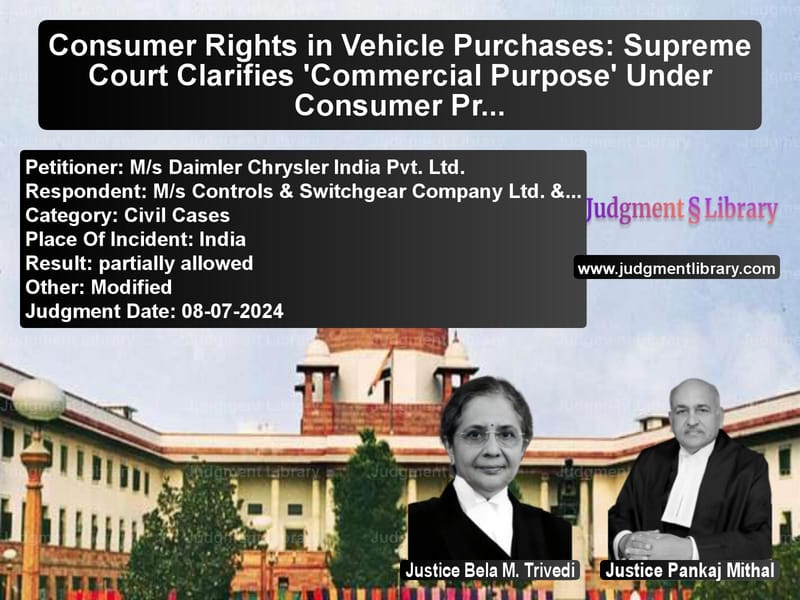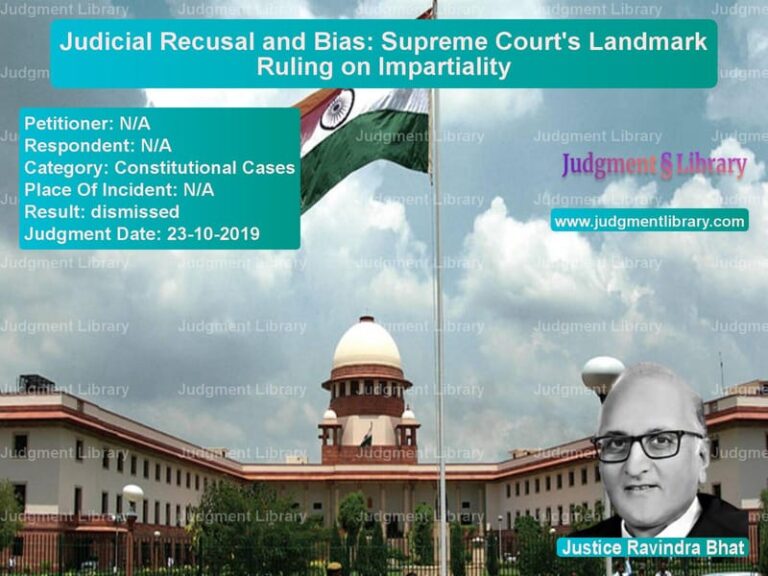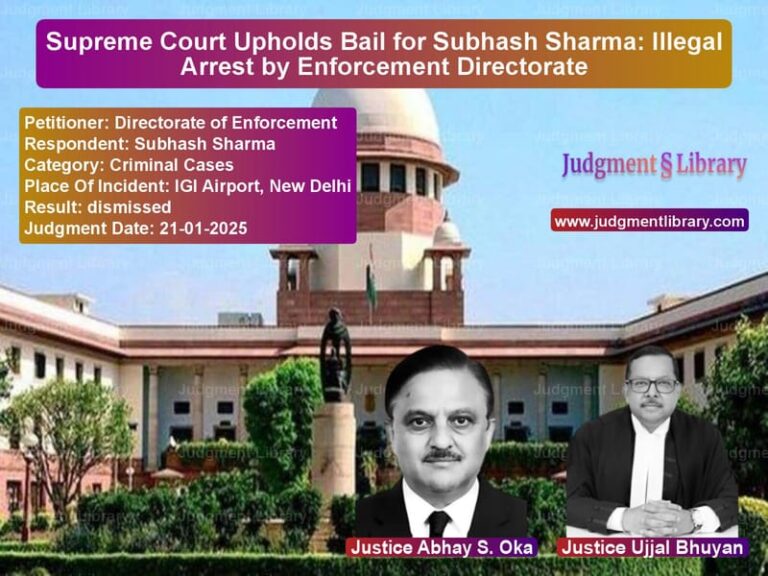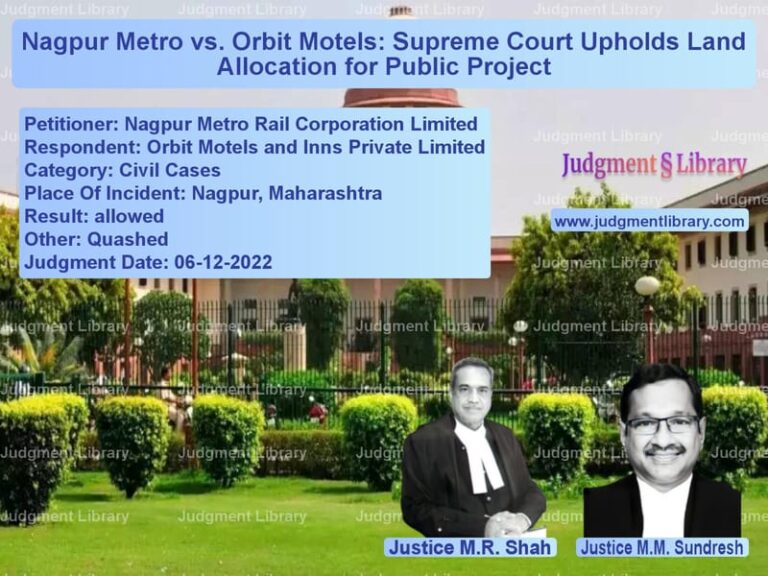Consumer Rights in Vehicle Purchases: Supreme Court Clarifies ‘Commercial Purpose’ Under Consumer Protection Act
The case of M/s Daimler Chrysler India Pvt. Ltd. vs. M/s Controls & Switchgear Company Ltd. raises significant legal questions about the definition of ‘consumer’ under the Consumer Protection Act, 1986 (now replaced by the Consumer Protection Act, 2019). The Supreme Court, in its judgment dated July 9, 2024, examined whether a company purchasing a vehicle for the use of its directors would fall within the definition of a consumer or whether such a purchase would be considered for a ‘commercial purpose’ and thus be excluded from the Act’s protections.
Background of the Case
The case involved three separate appeals, all concerning similar questions regarding consumer rights, commercial use, and the obligations of automobile manufacturers. The primary dispute arose when the complainant, M/s Controls & Switchgear Company Ltd., purchased a Mercedes-Benz vehicle for use by its directors. The vehicle, however, exhibited defects that led to multiple complaints, ultimately resulting in a case before the National Consumer Disputes Redressal Commission (NCDRC).
The key issues in this case included:
- Whether a company purchasing a vehicle for its directors’ use qualifies as a ‘consumer.’
- Whether the purchase of a high-end luxury car falls under ‘commercial purpose.’
- What constitutes ‘unfair trade practices’ when promoting automobiles?
- The legal obligations of automobile manufacturers in cases of product defects.
Judgments of the NCDRC and High Courts
The NCDRC ruled in favor of the complainants, holding that:
- The complainant company was a valid consumer since the vehicle was not used for profit-making or commercial activities.
- The defects in the vehicle constituted ‘deficiency in service.’
- Mercedes-Benz was liable to replace the vehicle or refund its cost.
The automobile manufacturer, Daimler Chrysler India Pvt. Ltd. (now Mercedes-Benz India Pvt. Ltd.), challenged this decision, leading to the case’s escalation to the Supreme Court.
Key Legal Issues Considered by the Supreme Court
1. Definition of Consumer Under the Consumer Protection Act
The central issue was whether the purchase of a vehicle by a company for its directors’ use constituted a ‘commercial purpose.’ The Act defines a ‘consumer’ as someone who buys goods for personal use, excluding those who purchase goods for resale or commercial purposes. However, the Supreme Court clarified that:
- Purchases for a company’s operations, especially where the goods are not used for revenue generation, do not qualify as commercial transactions.
- Vehicles bought for the personal use of directors do not fall under ‘commercial purpose.’
- The determining factor is the dominant intention behind the purchase.
2. Defects in the Vehicle and Consumer Rights
The complainant alleged that the vehicle had excessive heating issues, particularly on the central hump over the drive shaft. Multiple complaints and inspections confirmed this defect. The manufacturer, however, failed to provide an effective solution. The Supreme Court held:
- The persistent heating issue was a ‘defect’ under the Consumer Protection Act.
- The manufacturer’s failure to rectify the problem constituted ‘deficiency in service.’
- The complainant was entitled to a refund or replacement under consumer protection laws.
3. Unfair Trade Practices in Automobile Sales
The complainant further alleged that Mercedes-Benz had engaged in unfair trade practices by misrepresenting the safety features of its vehicles. Specifically, in a separate appeal involving CG Power and Industrial Solutions Ltd., the airbags of a Mercedes-Benz E-Class failed to deploy during a collision, despite marketing claims about advanced safety features.
The Supreme Court ruled that:
- Automobile manufacturers must provide accurate and complete information about safety features.
- Failure to disclose the exact conditions under which airbags deploy constitutes an ‘unfair trade practice.’
- Misleading advertising regarding vehicle safety attracts liability under consumer protection laws.
Final Judgment and Directions by the Supreme Court
The Supreme Court delivered a split ruling:
For Daimler Chrysler India Pvt. Ltd. (Mercedes-Benz India Pvt. Ltd.)
- The court held that the complainant company was a ‘consumer’ under the law.
- The defects in the vehicle warranted a refund or replacement.
- However, given that the complainant had used the vehicle for 17 years, a full refund was not feasible.
- Mercedes-Benz was ordered to pay Rs. 36 lakh to the complainant instead of the originally ordered Rs. 58 lakh.
For CG Power and Industrial Solutions Ltd.
- The non-deployment of airbags during a serious accident was considered a critical defect.
- The manufacturer was ordered to pay Rs. 5 lakh in compensation for deficiency in service.
- An additional Rs. 5 lakh was imposed for unfair trade practices.
- Mercedes-Benz was directed to revise its owner’s manuals and website information to clarify the conditions under which airbags deploy.
Key Takeaways
- Consumer Definition Expanded: Companies purchasing goods for non-commercial use are entitled to consumer protection.
- Product Defects Are Actionable: Persistent defects, if unaddressed, can lead to manufacturer liability.
- Advertising Must Be Honest: Misrepresentation of product capabilities attracts liability.
- Long-Term Use Affects Compensation: If a defective product has been used for years, full refunds may not be granted.
Conclusion
The Supreme Court’s judgment clarifies that a company buying a vehicle for non-commercial use can still be a ‘consumer’ under the law. It also reinforces manufacturer liability for defective products and misleading advertising. This ruling strengthens consumer rights while ensuring businesses act transparently in marketing and product quality.
Petitioner Name: M/s Daimler Chrysler India Pvt. Ltd..Respondent Name: M/s Controls & Switchgear Company Ltd. & Anr..Judgment By: Justice Bela M. Trivedi, Justice Pankaj Mithal.Place Of Incident: India.Judgment Date: 08-07-2024.
Don’t miss out on the full details! Download the complete judgment in PDF format below and gain valuable insights instantly!
Download Judgment: ms-daimler-chrysler-vs-ms-controls-&-switc-supreme-court-of-india-judgment-dated-08-07-2024.pdf
Directly Download Judgment: Directly download this Judgment
See all petitions in Consumer Rights
See all petitions in unfair trade practices
See all petitions in Contract Disputes
See all petitions in Judgment by Bela M. Trivedi
See all petitions in Judgment by Pankaj Mithal
See all petitions in partially allowed
See all petitions in Modified
See all petitions in supreme court of India judgments July 2024
See all petitions in 2024 judgments
See all posts in Civil Cases Category
See all allowed petitions in Civil Cases Category
See all Dismissed petitions in Civil Cases Category
See all partially allowed petitions in Civil Cases Category







